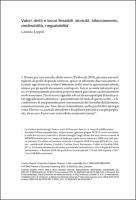Chapter Valori, diritti e lavori flessibili: storicità, bilanciamento, declinabilità, negoziabilità
| dc.contributor.author | ZOPPOLI, Lorenzo | |
| dc.date.accessioned | 2022-06-01T12:30:40Z | |
| dc.date.available | 2022-06-01T12:30:40Z | |
| dc.date.issued | 2022 | |
| dc.identifier | ONIX_20220601_9788855184847_816 | |
| dc.identifier.issn | 2704-5919 | |
| dc.identifier.uri | https://library.oapen.org/handle/20.500.12657/56632 | |
| dc.description.abstract | This article traces the national and EU legal framework after the progressive affirmation of the so-called flexible and non-standard contracts, with particular regard to fixed-term contracts, temporary agency work, part-time work and to work on demand. According to the author, notwithstanding deep changes in legislation, collective bargaining, case-law and in doctrine, the centrality of the legal value attributed to permanent contract of employment was not called into question. However, the techniques of promotion and protection of this crucial value are not consequent. Such a value has been recently reaffirmed also at European level by the Social Pillar and the directives of 2018 and 2019. This discrepancy can be overcome by specifying better the notion and sanctions in case of abuse of atypical work and by reinforcing legitimacy and negotiating skills of workers at both individual and collective level. | |
| dc.language | Italian | |
| dc.relation.ispartofseries | Studi e saggi | |
| dc.subject.other | flexible and non-standard contracts | |
| dc.subject.other | labour law | |
| dc.subject.other | neoliberal economic thought | |
| dc.subject.other | social freedom | |
| dc.title | Chapter Valori, diritti e lavori flessibili: storicità, bilanciamento, declinabilità, negoziabilità | |
| dc.type | chapter | |
| oapen.identifier.doi | 10.36253/978-88-5518-484-7.20 | |
| oapen.relation.isPublishedBy | bf65d21a-78e5-4ba2-983a-dbfa90962870 | |
| oapen.relation.isbn | 9788855184847 | |
| oapen.series.number | 231 | |
| oapen.pages | 27 | |
| oapen.place.publication | Florence |

